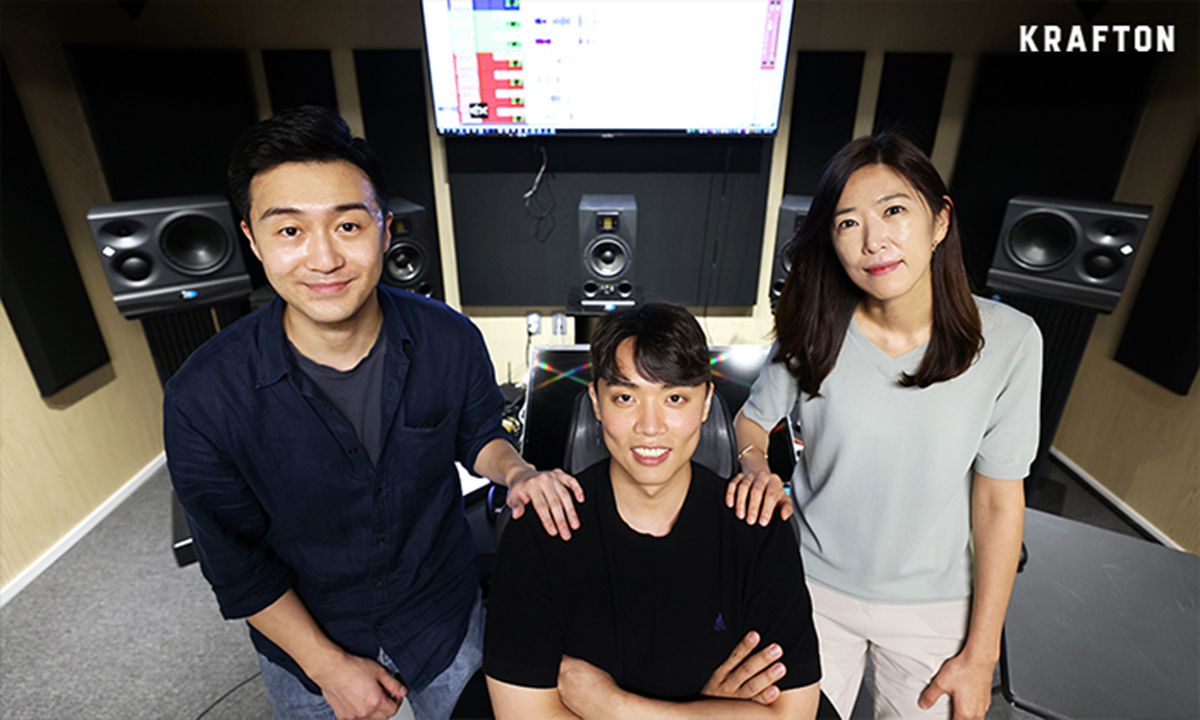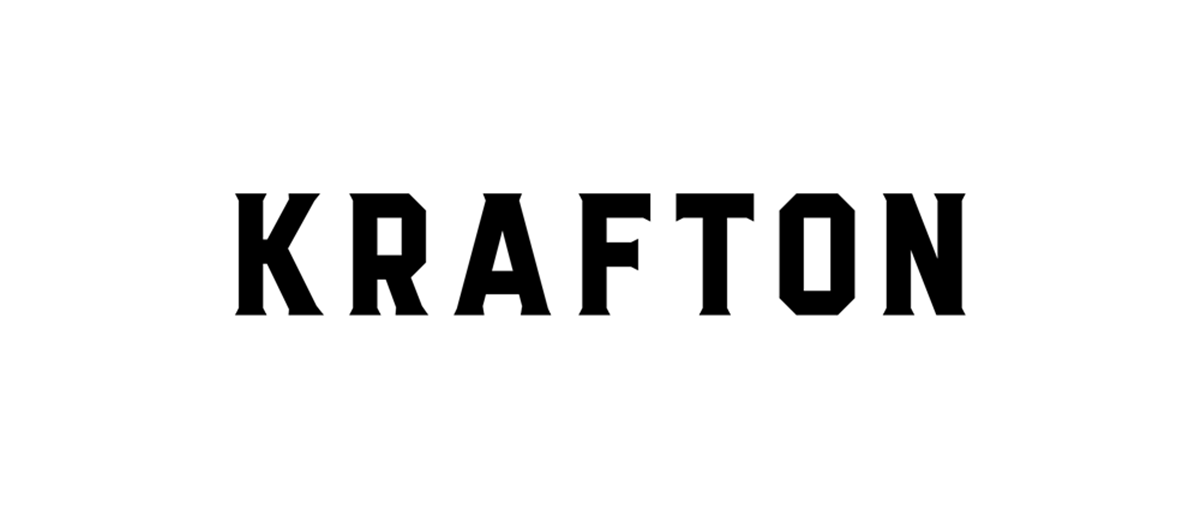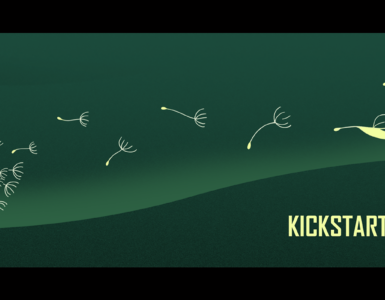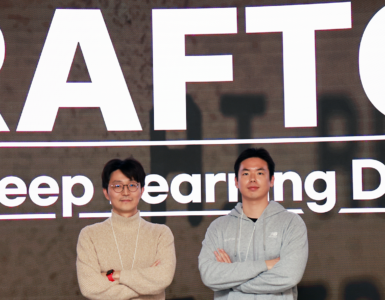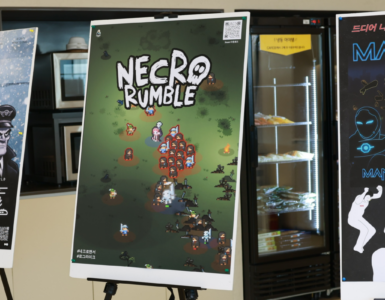An interview with KRAFTON Audio Dept.
From fabulous visuals to touching stories and well-designed systems, games provide the players with enjoyment in various ways. That’s why it’s called a composite art. Sound is another crucial pillar for most games as it gives fun through hearing. Read onto the following interview with Haejin Lee, Taeho Park and Jihoon Yu of Audio Dept. who help make the gaming experiences more immersive and interesting from the diverse fields of audio.
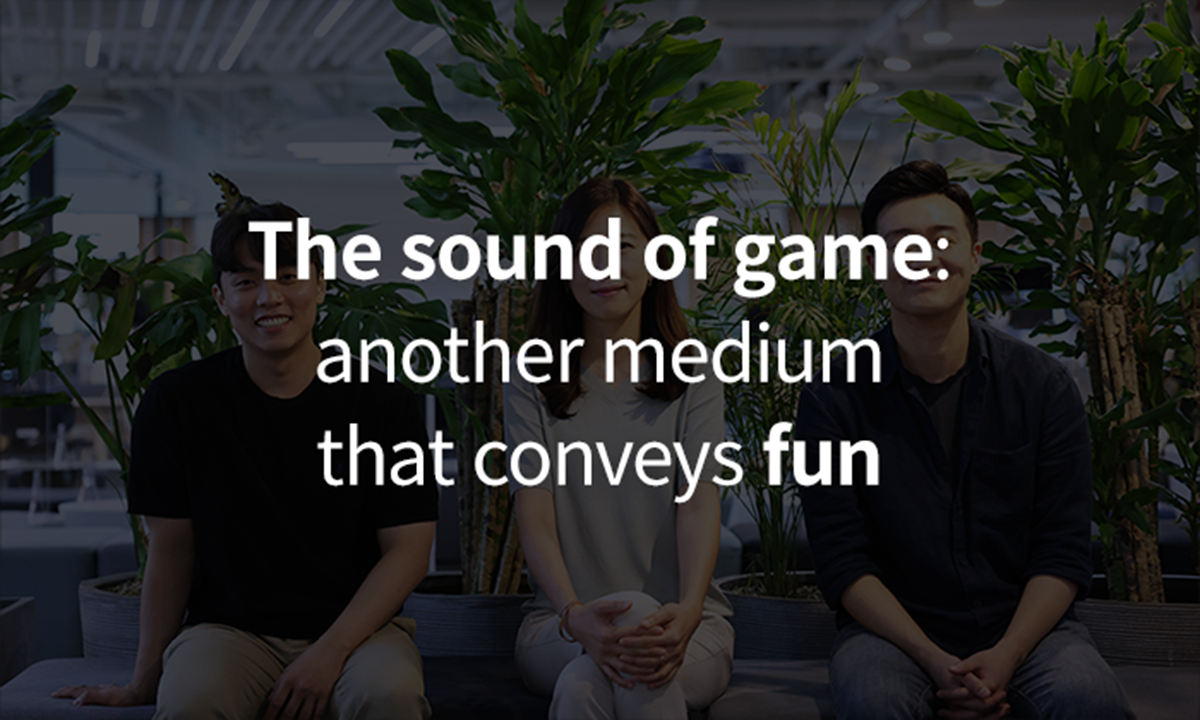
Nice to meet you. Could you introduce yourself to our readers?
Taeho Park: Hello, I’m Taeho Park. I’ve worked in KRAFTON for about four years now and I belong to Audio Dev Part of Audio Production Team. When I was young, I loved two things. One was singing and the other was playing games. It’s a very special experience to work closely with what I love since I was a kid.
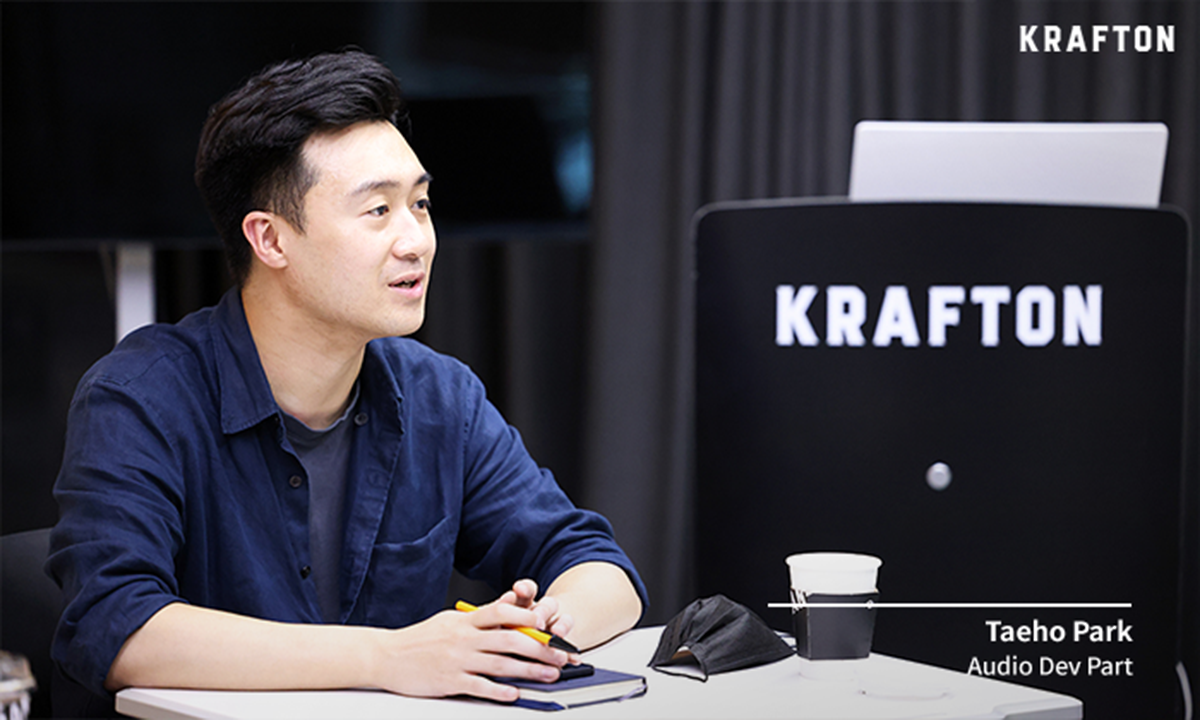
Jihoon Yu: I’m Jihoon Yu from Audio Live Part of Technical Audio Team. My major tasks are development and sound design related to “PUBG: BATTLEGROUNDS” intellectual properties (IP). When I was a child, I learned how to play various instruments. In particular, I played the violin for quite a long time. I’ve grown my affection to music in the process. When I was a student, I liked hip-hop so much that I started to learn music, hoping to be a hip-hop producer one day.
But, since hip-hop was not one of the mainstream genres back then, it was difficult for me to choose it as a major. In the end, I decided to major in recording and record engineering, which are a part of practical music that seemed quite beneficial for my future. One day, I took a course about game sound by chance, and it turned out to be very exciting for me. Since I loved games, the idea of combining my major and gaming was very intriguing to me. That’s how it went on and now I’m working in KRAFTON.
Haejin Lee: I’m Haejin Lee, the lead of Audio Dept. I’ve worked in the game industry for nearly 20 years, and I’ve been working in KRAFTON for about 10 years now. Yes, it’s a very long time (Laughs). I got my foot in the door of music when I started learning classical piano. I was seven at that time. I studied music dreaming of a pianist, but I noticed my limitations at some time. That is, I realized early that I could not succeed as a pianist.
Nevertheless, as I tried to study something else, it was not easy to go to totally different directions because I’ve already been with music for a long time. Thinking over what else I could do with music, I got interested in audio engineering. I went to Germany to study and work in that field.
Coming back to Korea, I worked at a production studio for surround mixing. Most works were from the movie industry. During that period, I’ve grown an interest into composition. It was intriguing. In particular, I was interested in composing symphonic music. It was 20 years ago from now and symphonic music didn’t make up a large portion of film music in Korea, unfortunately. I could not find many opportunities to try symphonic music in the movie industry.
As I was exploring a field where I could work on symphonic music, I came up with the game industry. It’s because some games that are based on a medieval fantasy world, for example, often adopt symphonic music for their background music. So, I started to work as a composer in the game industry and some 10 years later, I joined KRAFTON.
When I just entered this company, KRAFTON was trying to change itself to become a provider of more diverse games. That was one of the reasons why I chose KRAFTON.
Thinking of what an audio department does in a game company, many people would come up with works related to background music and sound effects for games. But Audio Dept. is actually dealing with more diverse works. Could you elaborate on your roles and responsibilities in detail?
Haejin: In fact, we basically do what you just said. We work on all kind of sounds for almost of the games made by KRAFTON.
Taeho: We produce backgrounds music and sound effects and do some recording works with voice actors. Moreover, we edit and master backgrounds music and sound effects so that they sound “better.” And yes, modulating recordings are also our job. Sometimes, we get directly involved in game development. It’s because realizing sounds in the game engine is as important as producing sounds.
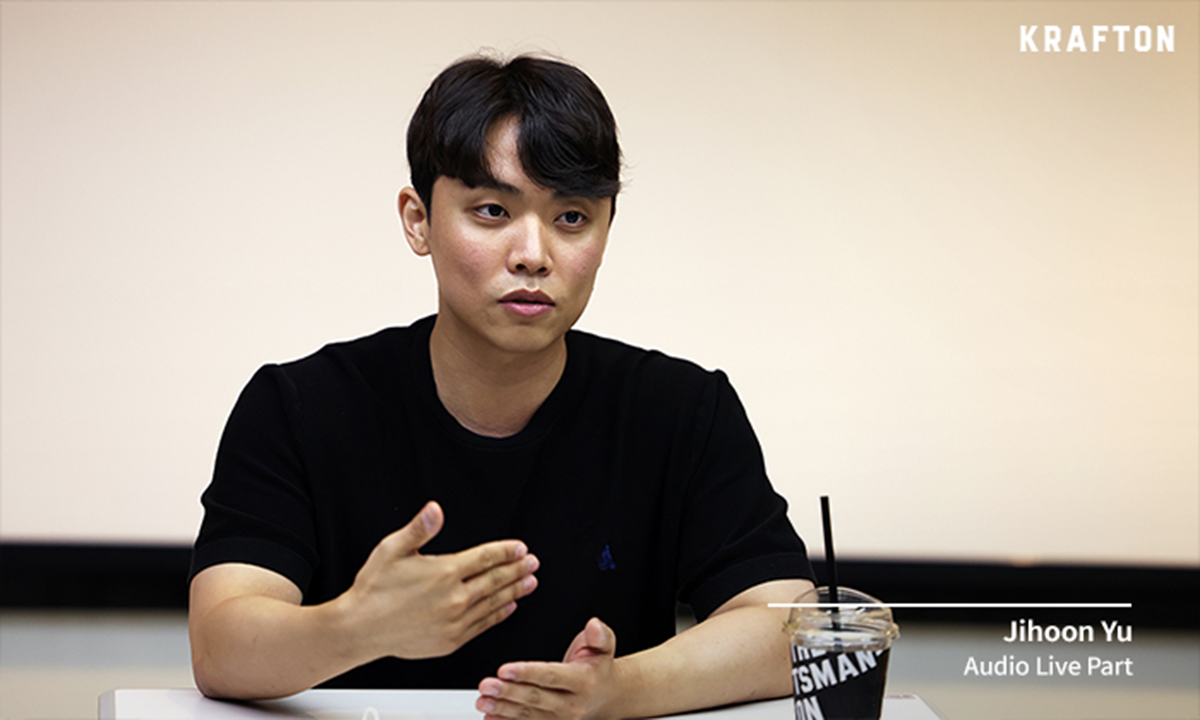
Jihoon: As Taeho said, we often dedicate much more time to game development to put sound system inside the game than to design the sounds. I’ll compare this to movie for your understanding. In a movie, certain sounds are set to be played in certain scenes and in certain moments. However, such things happen otherwise in games. Depending on how each player go through the game, certain sounds can be played in different directions and in different levels. So, it’s very important to set sounds according to the given situations and in-game physics setting.
For example, when we produce a character’s footsteps, sounds may be affected by diverse variables such as the speed, materials of the floor, which floor of a building the character is on, if it is inside a building or outside, if there is a wall and so on. We must consider all that when we produce game sounds. A vehicle also makes different sounds depending on its speed and the conditions of its engine and gear. We try to make them sound organic and natural way. Although they are not in this interview, we have some people in Audio Program Part who dedicate even more to embody the sound system, which is designed to modify those sounds, in the engine or in the game.
Haejin: As KRAFTON runs a dedicated audio department, it is capable of directly applying the audio contents and assets to game development engine. This is one of our most important tasks. We have accumulated experiences in providing a game’s live service for the global markets for quite a long time and we also can produce plug-ins necessary for game development by ourselves. I believe these things are what makes KRAFTON’s Audio Dept. stand out in this industry.
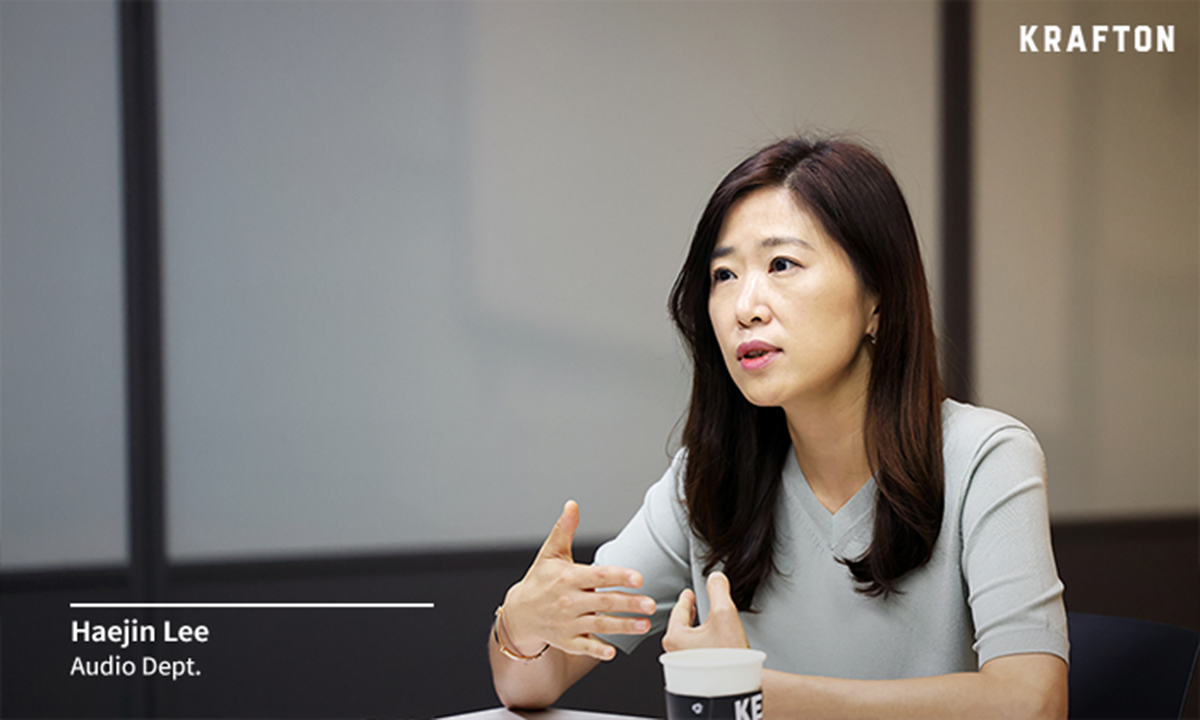
Though many of you majored in audio-related studies, you might have to continue learning more skills and tools to be able to get involved in the game development process. What do you do at Audio Dept. to enhance such competencies?
Haejin: It’s obvious that there are a variety of specific fields in audio. Thinking of Audio Dept. alone, we have composers, sound designers, and some others who work on mixing and engineering. Getting involved in the game development process is also included in this. Every single one is a professional field, so we keep training.
Taeho: We do some regular training programs internally. Every one of us at Audio Dept. has deeply studied and experienced each subdivided area of audio. Although we are all in the same department, our experiences are varied. As different people have different drawing styles, it’s same in the audio sector. Therefore, paying respect to creativity and originality as much as we can, we run these programs to consistently produce quality results. By doing so, we believe we can elevate our capabilities on average.
Jihoon: Apart from education, I can find lots of interesting cases every time I participate in development projects. When we encounter very good cases that are not so easy to find in other projects, we believe it’ll be good to share the experiences together with our colleagues in Audio Dept. So, we have a regular seminar session to share such cases. We do presentations there.
We had researched for quite a while to realize a specific sound for a project in the past. We couldn’t apply what we researched to the actual development project. But we continued our research by ourselves believing that we could use them for other projects. In the process, we learn how to apply technologies and we could make better use of audio middleware.
Haejin: We always want to challenge, but actually it’s not that easy to get out of the comfort zone as we think. The same is true for development. We are sometimes pressed by time, which often make us compromise. But, as we are working with lots of different project, we can tap into what we’ve learned from the past experiences for other projects that we work on in the future. In that way, our expertise is getting strengthened and specialized, which is another advantage of working at Audio Dept.
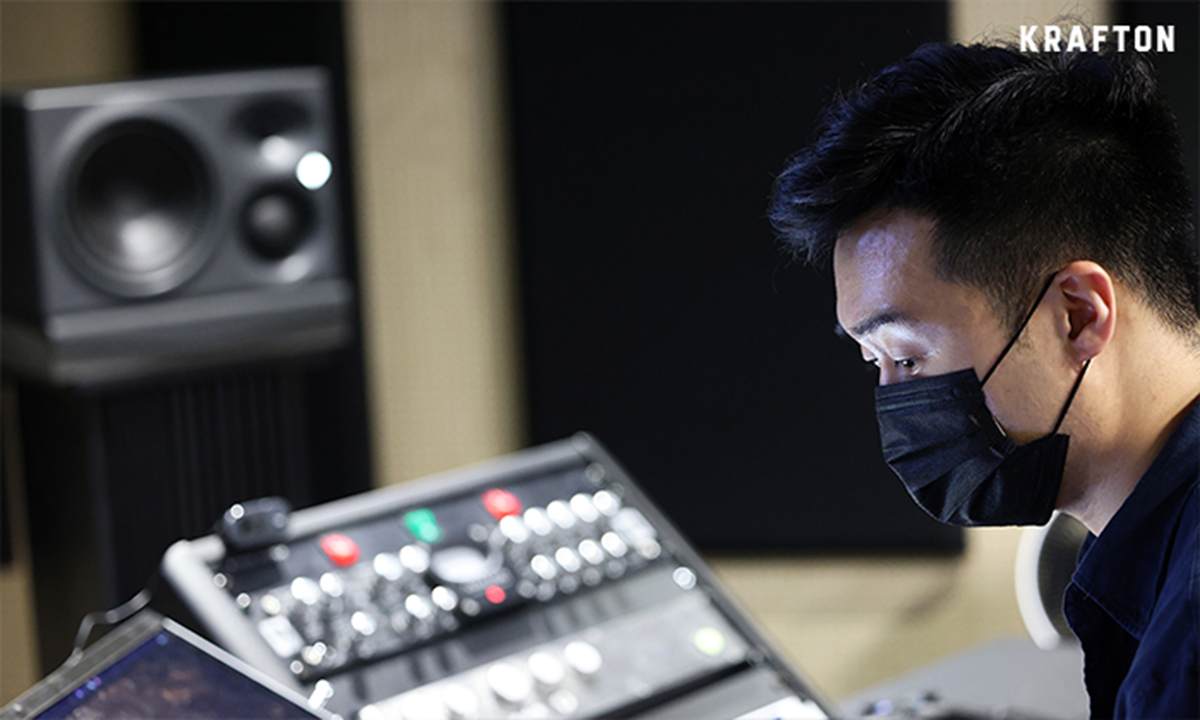
It seems quite uncommon to have expertise both in audio and game development at the same time. Being able to develop such capabilities could be a huge merit to work at Audio Dept., KRAFTON.
Jihoon: I totally agree. Now I’m working on much deeper and more diverse tasks than I imagined before joining KRAFTON. I’m very satisfied with having such new experiences continuously.
Taeho: Even if you made certain game sounds, you won’t be able to put them properly in the game, if you don’t understand the game engine or collaborate with programmers. It’s difficult work to do alone outside a company.
Jihoon: You can do it only when you have an actual game to try applying those sounds, which itself is a very rare case. Even if you have, whether you can apply them is a totally different matter. It’s not easy to learn such stuff in college.
Haejin: He’s right. It’s because it’s hard to try without proper working conditions like in the company.
Since you’re all professionals in music, you might have special taste in music. What genre of music do you usually listen to in your free time?
Taeho: I listen to hip-hop music very often these days. Particularly aggressive ones (Laughs). When I was a teenager, I liked ballad songs a lot, and I shifted to EDM in my 20s. My taste keeps changing.
Jihoon: I usually listen to hip-hop, too. It became one of the mainstream genres in Korea in the last few years, so I can easily find good hip-hop songs. When I was a student, I tried many different genres, but it’s hip-hop that still stays on my playlist to the end.
Haejin: As I’m working at the audio industry, I think I should listen to various kinds of music keeping in mind that I should learn from listening. Still, tango music is my favorite. What I listen to the most is ones that express Argentine’s darkness or melancholy. Astor Piazzolla is my favorite artist. I love his melody that sounds like bleeding emotions.
Apart from you own works, what’s the most impressive game music for you so far?
Jihoon: “League of Legends” release new login screen theme songs every time a new champion is launched. I like those songs because they present interesting new approaches and concepts that match well with the character. Also, I could see their efforts to capture the characters’ stories within the music.
Taeho: I like the League of Legends music that are made under collaboration with various artists.
Haejin: I love the music from “The Elder Scrolls,” created by composer Jeremy Soule. He has worked on the music of The Elder Scrolls series for a long time, and he usually composes songs without melody. I like his works because I know it’s very difficult type of music to make well.
Next question is about the working culture. You work in separated sound isolation booths which means the working environment of Audio Dept. is quite different. Do you have any special system to share information or make decisions within Audio Dept.? If you’re using a specific tool for communication, please tell us about it.
Haejin: We use a tool called “Trello” to share information. Basically, we use “JIRA,” but we believe Trello can help us grasp the work progress of each team in a more organized way. We proactively use those tools not just because our workspaces are divided, like you said, but also, we had to from home in the recent period due to the pandemic.
Speaking of which, Audio Dept. has collaborated with developers in physically faraway studios in Seocho and Yeoksam in Korea, Amsterdam in the Netherlands, or Madison in the United States even before the pandemic. Therefore, we’ve already been get used to such tools and we haven’t been influenced severely when we had to do work remotely due to the pandemic.
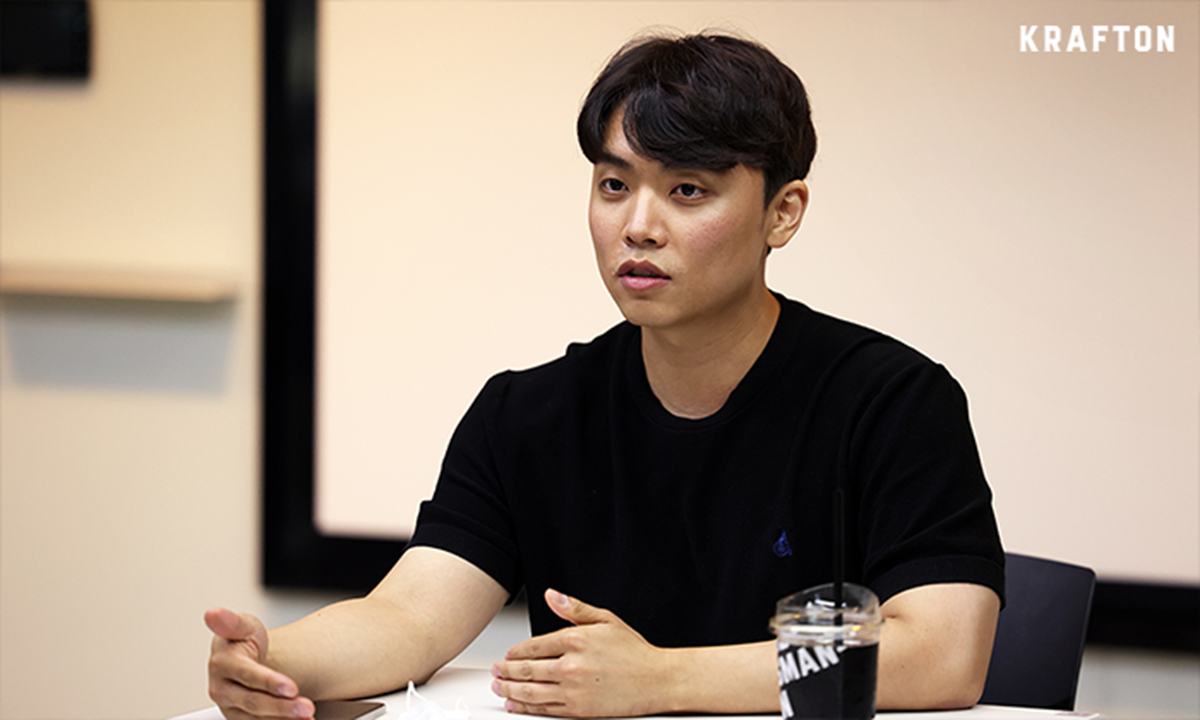
As you mentioned earlier, you’re collaborating with not just your colleagues in Korea but those in the overseas studios as well. Could you tell us more about this experience?
Taeho: We frequently work with foreign voice actors, using remote working technologies. Some of them are very well-known voice actors who took part in very popular games. I recently got a chance to collaborate with a voice actor who worked on one of my favorite games and it really was mind-blowing (Laughs). It’s very intriguing that I can work together with overseas voice actors, too.
Jihoon: When I work with developers in Amsterdam and Madison, I get various user feedbacks that are different according to cultures. It’s quite inspiring to learn from different cultures.
Taeho: We once developed what is called “Reverb Feature” which realizes echoes in space. When the development was done to some extent, we got conflicting feedbacks from the testers in the East and in the West. Eastern testers requested for cutting down or removing the feature because they couldn’t hear the opponents’ sounds. On the other hand, Western testers gave positive feedbacks that their gameplay experiences got abundant. I realized that feedbacks on features vary depending on which experience players value.
Haejin: Some of our colleagues in Audio Dept. visited a shooting range in Czech Republic and experienced gunshot sounds in person. On another occasion, one of the audio programmers from our Amsterdam office came to Korea to work with us. I remember that it was very condensed collaborating experience.
Jihoon: That’s right. Sound is hard to deliver just in words. On the other hand, some of our problems are resolved so easily and instantly when we do “just come over here and listen.” It’s a much easier and clearer way to understand while we work with others.
What skills or mindsets do you think are required to work in Audio Dept.?
Taeho: I think you need to be enterprising. The game industry is changing very fast. To catch up with the trend, you should study and develop your capabilities. Although we share much information and study together often, you still need to prepare yourself to be able to manage issues by yourself because you’ll encounter such unexpected situations working in different projects. That way, you’ll be able to work more smoothly.
Jihoon: I was thinking the same, I’m a bit late (Laughs). Communications skills are also crucial. As I mentioned earlier, it’s very hard to deliver sounds in words. I often get feedbacks regarding game sounds that only the speaker knows in their minds, such as “make it lighter” or “make it warmer.” So, if you can describe sounds more precisely and communicate well with developers, it must be helpful.
Haejin: You should like games first of all because we need those who have played games very much. And we don’t prefer to be put to work. As much as in the game industry, trends and technologies are continuing to change in fast past and are moving forward in the audio industry. Therefore, you have to endeavor by yourself. Though Audio Dept. have internal education system and archived our know-how that we have accumulated so far, you always have to find what you can learn beyond them and try to produce new outcomes based on what you’ve learned.
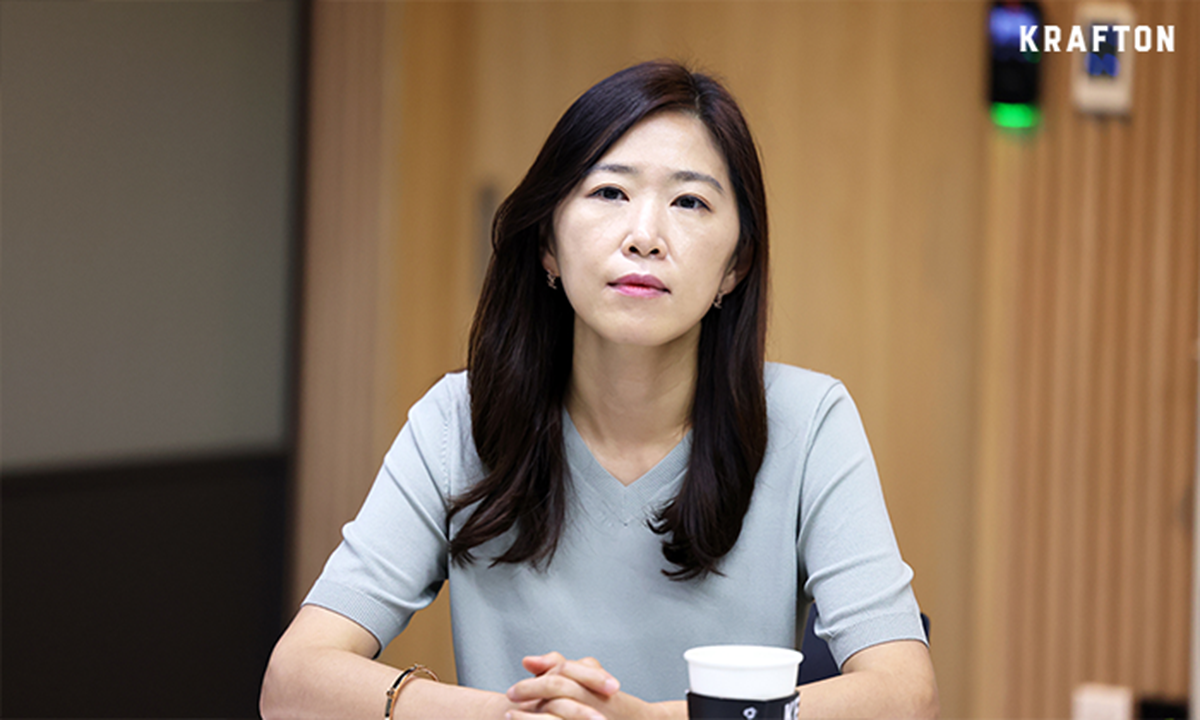
What is Audio Dept.’s goal and your personal goal working in the audio industry?
Taeho: I want to make a cool AAA game for consoles.
Haejin: Audio Dept. kicked off as a small organization and now is quite large. But our goal has always been the same from the beginning. Our aim is to be a department that can suggest the global standards of audio in the game industry so that many other game businesses would follow us.
Taeho: It’s like anyone who plays our game and listens to its sounds would say, “I knew it was made by KRAFTON!” Something like that (Laughs.)
Haejin: Exactly (Laughs). I’d like to get closer with fans with game sounds while keeping KRAFTON’s unique identity. I hope to hear everyone say, “This audio is from KRAFTON, as expected. I knew it!” once they hear it.
Jihoon: My goal is similar to that. I want to make audio which satisfies the escalating standards of the users while keeping our distinct identity that anyone can notice who made it. If that is possible, it would be a huge success.
Taeho: You’ve always said you want to hit the jackpot..
Jihoon: That is also true (Laughs). I’d like to work on another bigtime project after “PUBG: BATTLEGROUNDS.”
Last question. How would you define game sounds in single word?
Taeho: Game sounds are like “salt” to me. It’s because good game sounds make the players get more immersed into the game, like adding more flavor to food.
Jihoon: I’d like to define them as “energy” because they can provide the players with calm energy in still moments of a game and exciting energy in dynamic scenes.
Haejin: I think game sounds became a part of my life now. The meanings of sounds are not fixed. They can only be defined according to the context and the environment. In that sense, I think we’re already living in spaces full of sounds. For me, who’s living both in reality and in virtual spaces of games, the two are no longer separable.
